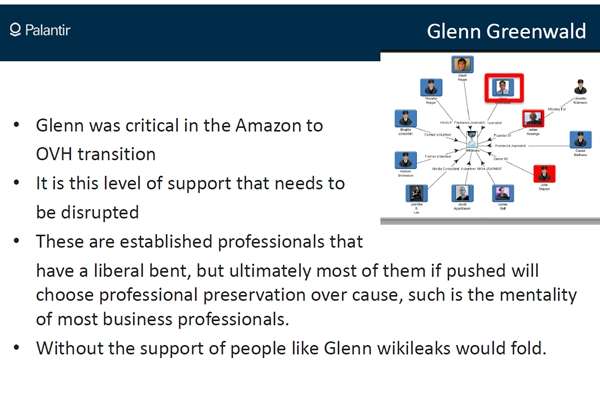by Steve Ragan – Feb 9 2011, 20:28
 Data intelligence firms proposed a systematic attack against WikiLeaks. (IMG: WikiLeaks)
Data intelligence firms proposed a systematic attack against WikiLeaks. (IMG: WikiLeaks)
Note: There were several drafts of the proposal created before the sixth and final version was delivered. The emails released by Anonymous contain each of them. Most of the changes are formatting related and minor corrections.
The proposal starts with an overview of WikiLeaks, including some history and employee statistics. From there it moves into a profile of Julian Assange and an organizational chart. The chart lists several people, including volunteers and actual staff.
One of those listed as a volunteer, Salon.com columnist, Glenn Greenwald, was singled out by the proposal. Greenwald, previously a constitutional law and civil rights litigator in New York, has been a vocal supporter of Bradley Manning, who is alleged to have given diplomatic cables and other government information to WikiLeaks. He has yet to be charged in the matter.
Greenwald became a household name in December when he reported on the “inhumane conditions” of Bradley Manning’s confinement at the Marine brig in Quantico, Virginia. Since that report, Greenwald has reported on WikiLeaks and Manning several times.
“Glenn was critical in the Amazon to OVH transition,” the proposal says, referencing the hosting switch WikiLeaks was forced to make after political pressure caused Amazon to drop their domain.

[Earlier drafts of the proposal and an email from Aaron Barr used the word “attacked” over “disrupted” when discussing the level of support.]
The proposal continues by listing the strengths and weaknesses of WikiLeaks. For the strong points, there is the global WikiLeaks following and volunteers. Outlining the weaknesses, the proposal lists financial pressure – due to the companies refusing to process WikiLeaks’ donations at the time – and discord among some of the WikiLeaks members.
“Despite the publicity, WikiLeaks is NOT in a healthy position right now,” an early draft of the proposal noted. “Their weakness [sic] are causing great stress in the organization which can be capitalized on.”
Some of the things mentioned as potential proactive tactics include feeding the fuel between the feuding groups, disinformation, creating messages around actions to sabotage or discredit the opposing organization, and submitting fake documents to WikiLeaks and then calling out the error.
“Create concern over the security of the infrastructure. Create exposure stories. If the process is believed to not be secure they are done. Cyber attacks against the infrastructure to get data on document submitters. This would kill the project. Since the servers are now in Sweden and France putting a team together to get access is more straightforward.”

After the tactics are discussed, the proposal outlines the highlights for each of the three data intelligence firms. From there, it concludes that in the new age of mass social media, the insider threat represents an ongoing and persistent threat “even if WikiLeaks is shut down.”
“Traditional responses will fail; we must employ the best investigative team, currently employed by the most sensitive of national security agencies.”
The emails released by Anonymous make no mention of the proposal’s success or failure. Aside from a single meeting confirmation with Booz Allen Hamilton, and an email that expressed hope that HBGary was going to “close the BOA deal”, there is no other data available.